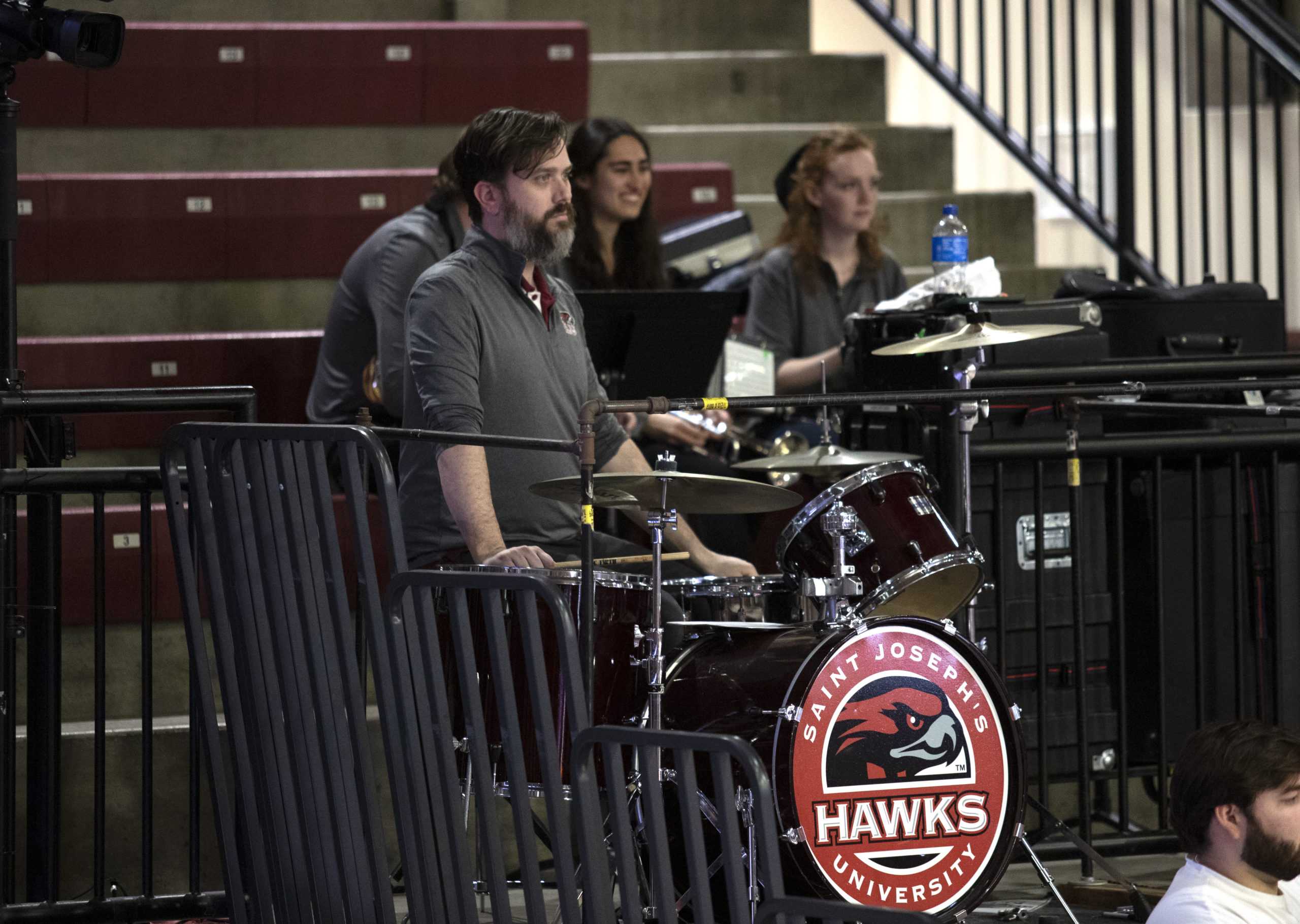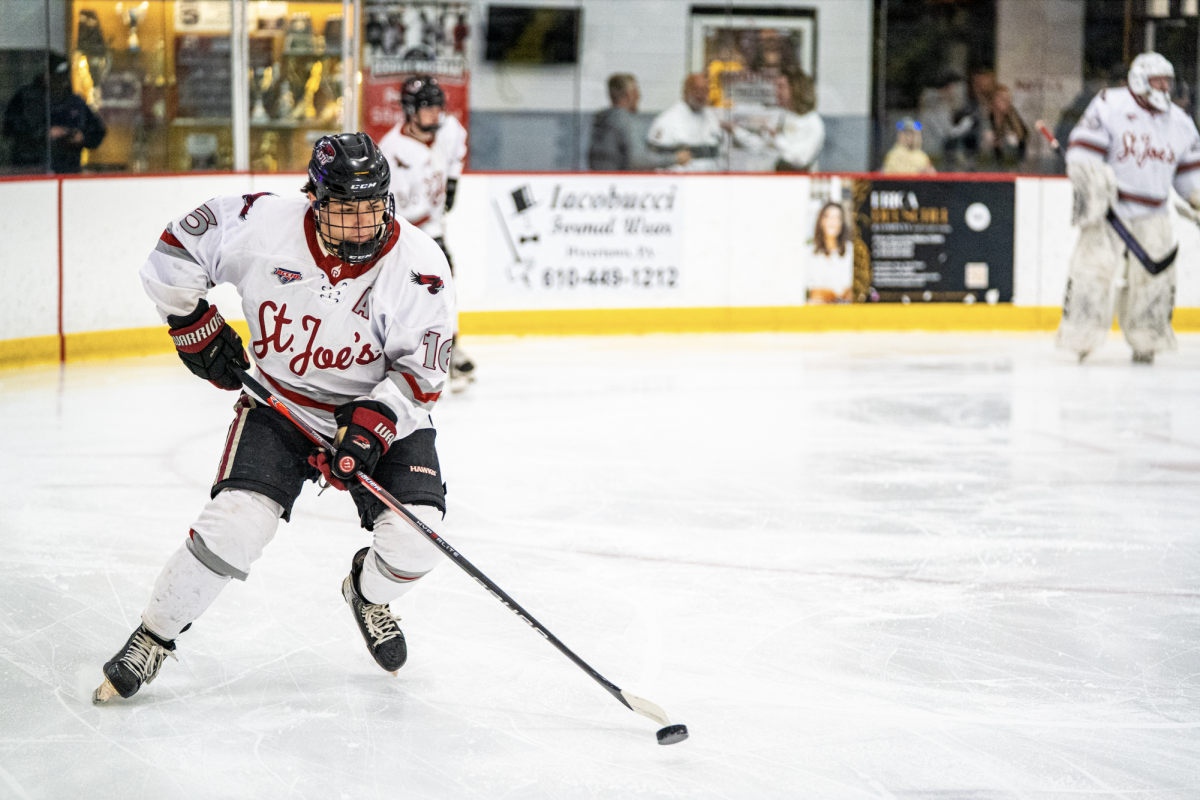While Hagan Arena was filled with basketball fans this season for the first time since 2020, Section 116, the St. Joe’s Pep Band’s reserved space, was generally sparse.
The band plays at men’s and women’s home basketball games and is composed of current students, alumni, friends and fans. Tim Laushey started the band in 1993 and directed it with his wife, Sue Laushey, for 27 years before retiring in 2020. There was no director for the 2020-21 season when spectators weren’t allowed at games. Ben Hemsley was hired as the new director in September 2021.
Band membership has taken a hit in recent years. In 2018, there were up to 30 members in the band. This year, there were nine. Some games this season, drummer Jason Greenwood ’23 was the sole member in the stands, a literal one-man band.
In 2019, SJU Athletics told the Lausheys that the athletic department could not financially support the program as it once did. While band members used to get paid $40 a game, they would no longer receive payments. Greenwood said the loss of pay created a shift in motivation to attend games.
“[My first year] I was basically getting paid to do what I love to do,” Greenwood said. “We were always playing as a band, which really motivated me to go. Getting paid obviously motivated me to go as well.”
Hemsley confirmed that current band members are not paid.
In response to a written question from The Hawk regarding whether band members might be paid in the future, Jack Jumper, director of Athletic Communications, wrote that “all aspects of the Pep Band are reviewed on a yearly basis.”
Grace Schairer ’22, a four-year trumpeter for the band, said she believes the loss of pay drove some people away, but not everyone.
“I think for a lot of people that was the motivation, but for a lot of people it wasn’t,” Schairer said. “There are people out there, like myself, for instance, who will still pursue it because they love music and love to play their instruments.”

In addition to losing payments, the aftermath of covid-19 and the possibility of having to play through a mask deterred participation, Schairer said.
“I think there was a lot of uncertainty regarding what covid protocols were and if we would even be allowed to play,” Schairer said. “That kind of caused that participation deficit.”
Hemsley said the change in leadership also likely affected participation as well.
“No matter who you are, no matter how good you are, when a new music teacher comes to your school or to your band, you see an attendance drop,” Hemsley said.
One way Hemsley differs from his predecessor is in the frequency of practices. According to clarinet player and three-year member Meg Buza ’22, Hemsley requested up to four hours of rehearsals per week at the start of the season. Used to a single, eight-hour rehearsal for the entire season in prior years, Buza said she was not able to make that jump in commitment. After two rehearsals, she dropped out of the band.
“It took a lot more time, and to put in all that extra effort and not being paid was a big difference,” Buza said. “Not being paid wasn’t the deciding factor, but all the changes that did happen, along with not being paid, just made it where it wasn’t enjoyable.”
For a Feb. 26 men’s game, the band put out a call for musicians on its Instagram page, offering “Court-side tickets for you and a guest, Hawks gear and more.”
This promotion resulted in 17 musicians occupying the band section with Greenwood on the drums.
But by a March 5 men’s game, the last home game of the season, the band section was back to just a handful of musicians.
For the Atlantic 10 (A-10) Women’s Basketball Championships in Wilmington, Delaware, in the first week of March, the Dover High Marching Band from local Dover High School was used to represent St. Joe’s, according to Jumper.
“The band represented the Hawks wonderfully,” Jumper wrote.
A week later at the A-10 Men’s Basketball Championships in Washington D.C., St. Joe’s had no band. The La Salle University Pep Band, which operates on a volunteer basis, had 19 members present.
Junior cheerleader Bella Paoli, who was at the game against La Salle, said “it was a completely different vibe with them having a band and us not.” According to Paoli, team morale was low without a band presence.
“Having a band is a huge game changer at events,” Paoli said. “For us especially, because we’re always calling out cheers, it’s easier to work alongside a band.”
This season, many timeouts during which band music would radiate through the rafters of Hagan Arena were instead filled with music played by a DJ. According to Schairer, the band provides an element to a sporting event that pre-recorded music will never quite capture.
“You’re so used to going to football games and basketball games and hearing the brass band come out and play the classic songs.” Schairer said. “I know that I miss having the live music. I’m sure a lot of people do too.”
Jared Farley ’22, who is in his second year as co-president of the official student-run fanbase, 54th Airborne, said he hopes the band plays on.
“It fills up the section with more passionate fans, so I’d like to have that back,” Farley said.
Hemsley is optimistic that attendance will increase for the band, and general spectators.
“As we get further and further from the hardcore covid and the lockdowns, we’re going to see attendance for the band and attendance for games and all that start to creep back up,” Hemsley said. “I do think there is a positive future.”

PHOTO: MITCHELL SHIELDS ’22/THE HAWK















































